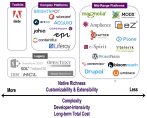Be Wary of Lock-in with Acquia
As one of the major commercial firms behind open source WCM platform Drupal, Acquia continues to move toward an IPO, taking yet another round of venture financing, and aggressively expanding its product set. But you should understand that as Acquia diversifies, its offerings can become more proprietary and less, well, Drupally...
The Traditional Acquia Castle
Historically, Acquia's business model revolved around risk reduction. First on-premise and now in the cloud, Acquia promised a kind of castle. It's a special (and expensive) castle where you can mingle selectively with pre-approved barbarians; otherwise, watch all the assorted -- and very interesting -- Drupalgoths and Drupalhuns from behind the safety of a strong wall.

The Drupal community: exciting but occasionally dangerous.
Acquia has always played a kind of double game here, talking up all the excitement and new ideas that migrating tribespeople can offer, but in the next breath pointing out how you still needed to keep the barbarians -- some friendly, some quite dangerous -- at bay.
Acquia concluded that the best way to create a castle was in the cloud, and (not coincidentally) investors value cloud revenue much more highly than on-premise income.
A Changing Business Model
The business challenge for Acquia is that hardened Drupal hosting has become somewhat of a commodity. A recent RSG survey found many plausible Drupal managed and cloud offerings. Like Acquia, several of these offerings provide sophisticated overlays on top of Amazon AWS or other IaaS providers.
Acquia seems to have responded by developing value-added Drupal applications that cost a monthly fee. Having lured you into its castle, Acquia now wants to sell you its specially sanctioned wine, cheese, and bread.
I've always believed that applications are a good thing. They create more productized business services on top of otherwise very developer-intensive platforms. But don't confuse Acquia products with standard Drupal modules.
Avoid Lock-in
Today, Acquia offers hosted products for:
- Search
- Behavioral personalization
- Multisite management
- CDN
- And more on the way
Note that unlike a standard Drupal module you swap in or out, these products bind you to Acquia. There is no formal community around them, save your fellow customers. With some exceptions, you can only use them in conjunction with Acquia's own cloud service, based on its own distribution of Drupal. In short, these products mimic offerings from a commercial software vendor.
This isn't a bad thing for the marketplace as a whole; however as a customer, you need to understand the lock-in implications, particularly if your vision of aligning with an open source project entails freedom and diversity among suppliers (e.g., decoupling software from hoster from add-on applications). The closer you get to Acquia's custom applications, the farther you get from the community goodness of Drupal.
In fact, when you buy application services from Acquia, you are joining a closed ecosystem. Today, it's a healthy and growing (if pricey) ecosystem, but it's not likely to be an easy one to leave at a future date.
That's just the way Acquia's investors like it. But is it right for you?
P.S. If you are wondering about the full breadth of the Web Content & Experience Management marketplace, consult this recorded webinar.








